Unit 3 Could you please tell me where the restrooms are-Section B (2a-2d)课件(共32张PPT)+内嵌音频
文档属性
| 名称 | Unit 3 Could you please tell me where the restrooms are-Section B (2a-2d)课件(共32张PPT)+内嵌音频 | 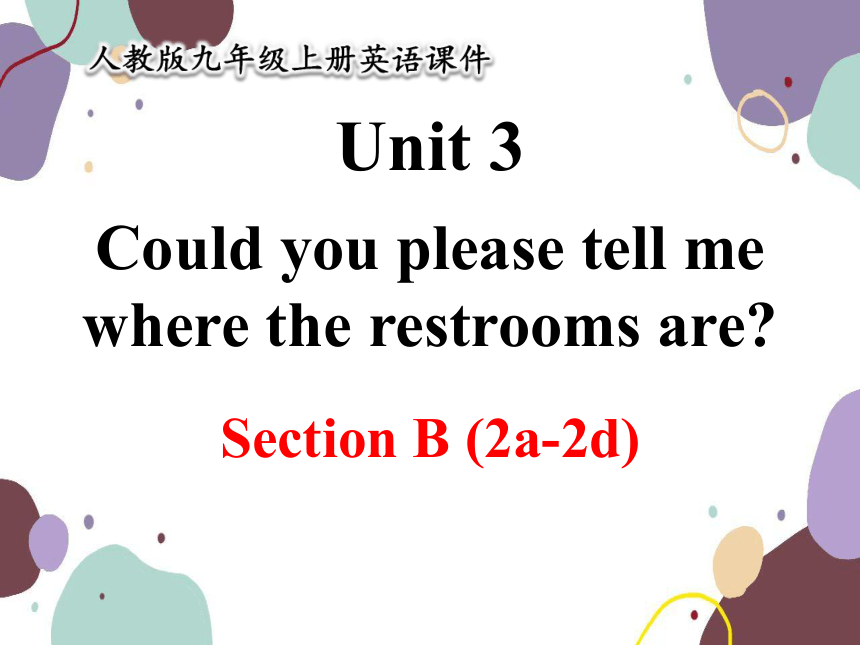 | |
| 格式 | pptx | ||
| 文件大小 | 25.2MB | ||
| 资源类型 | 教案 | ||
| 版本资源 | 人教新目标(Go for it)版 | ||
| 科目 | 英语 | ||
| 更新时间 | 2023-07-26 14:42:27 | ||
图片预览

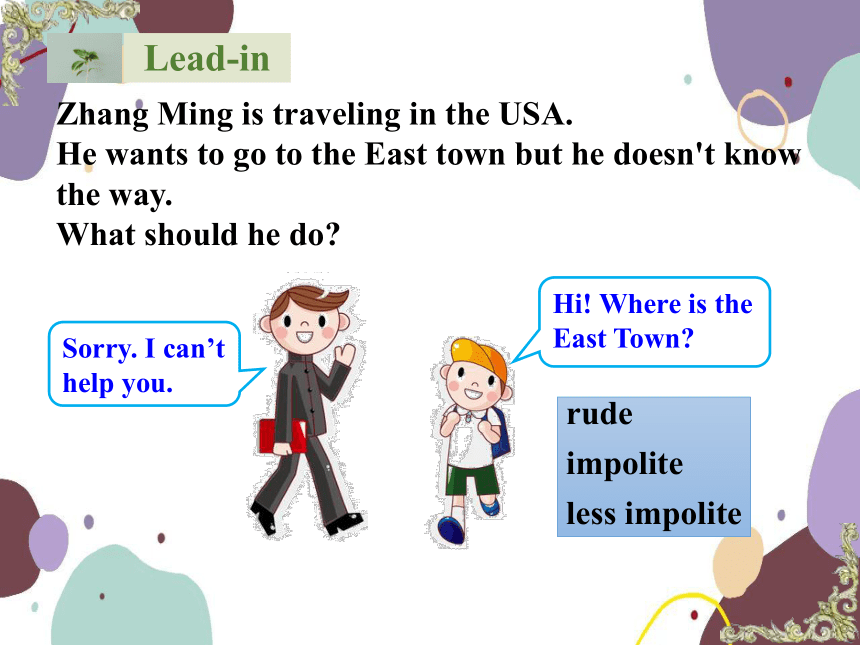
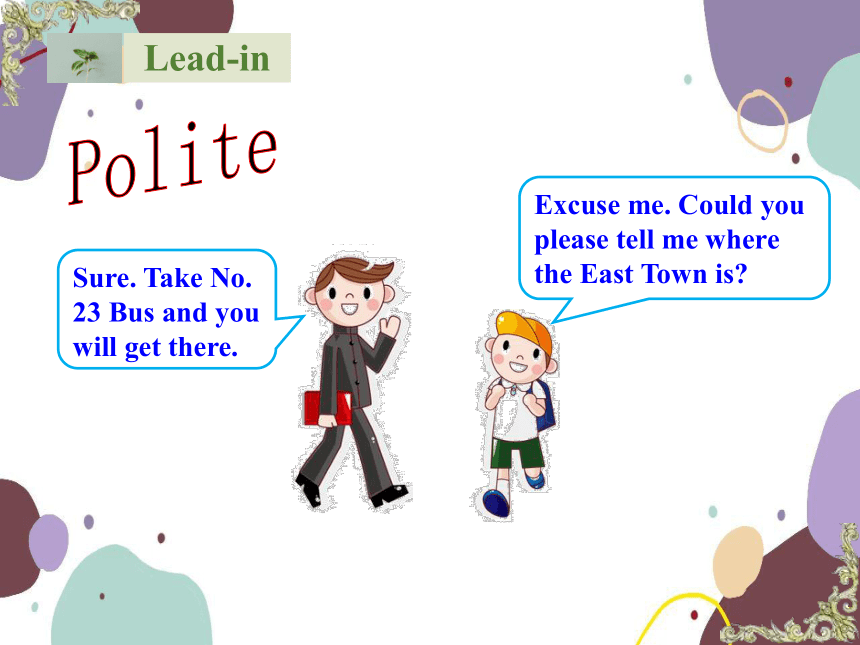
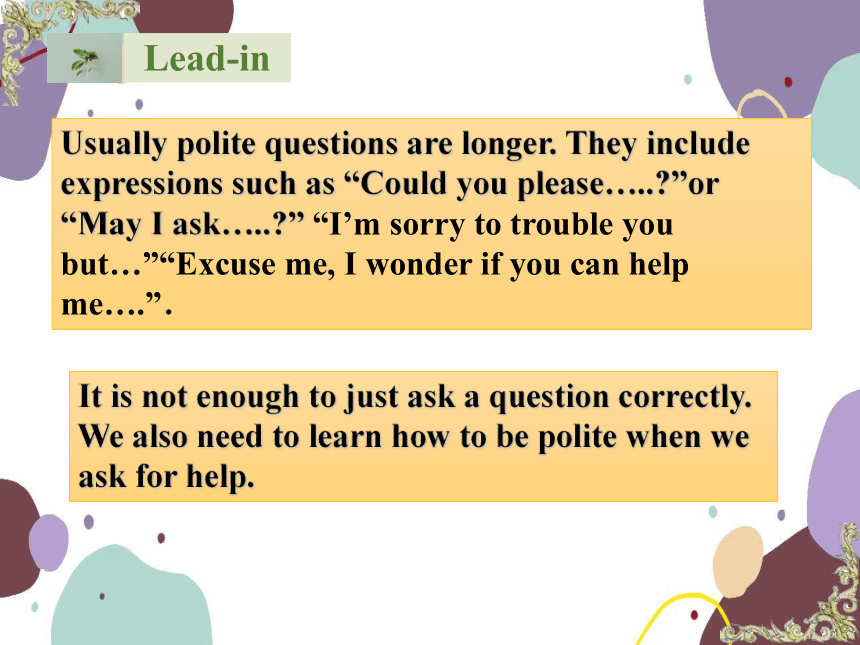
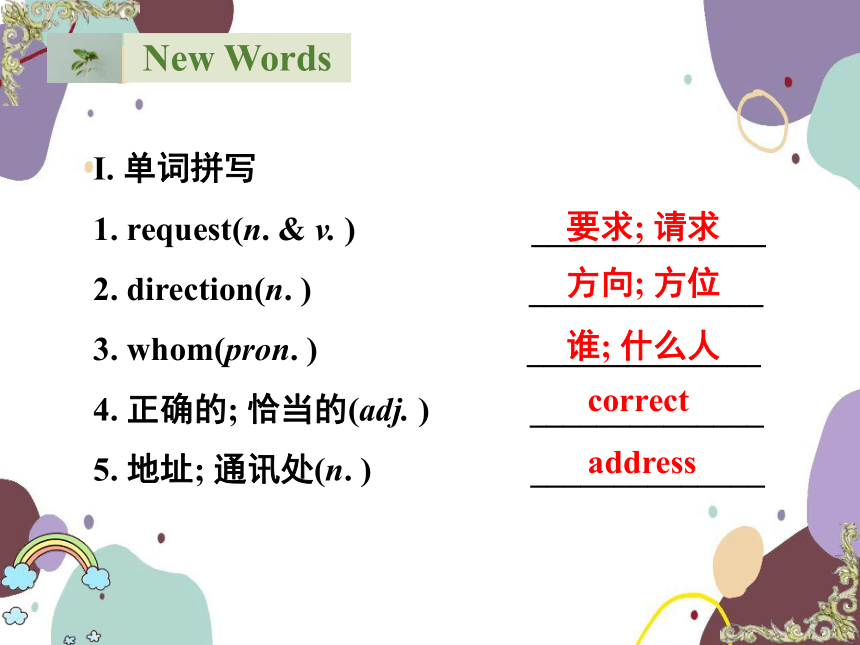
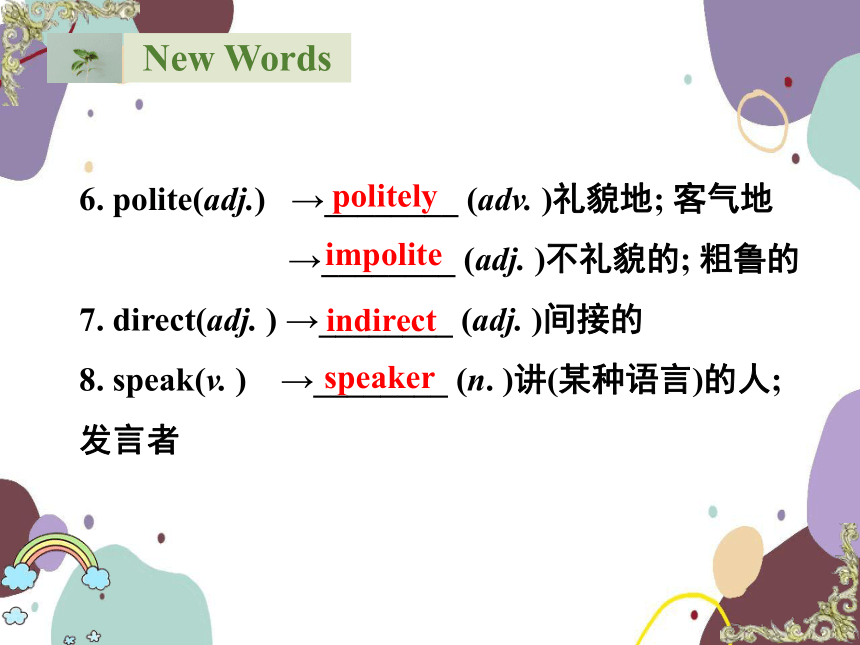
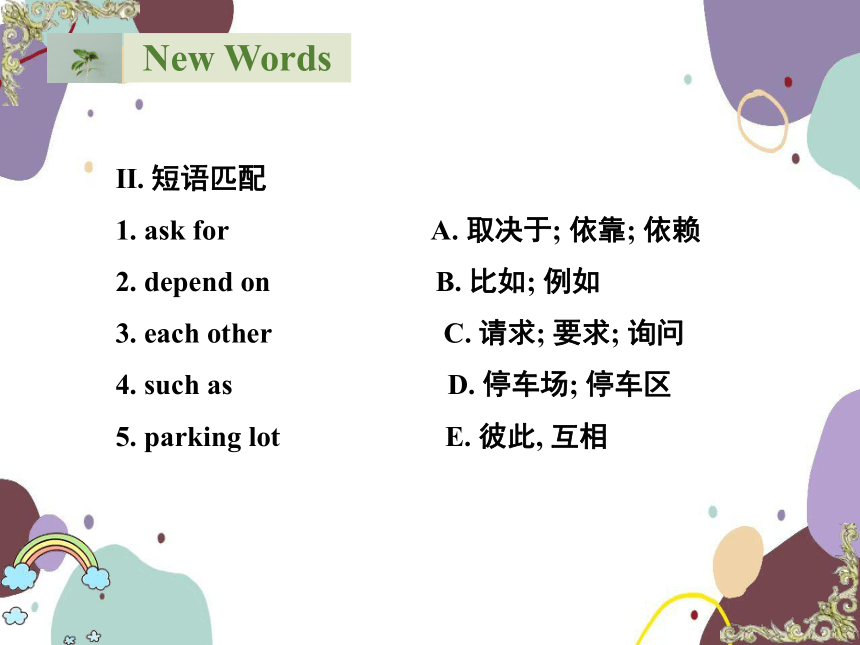
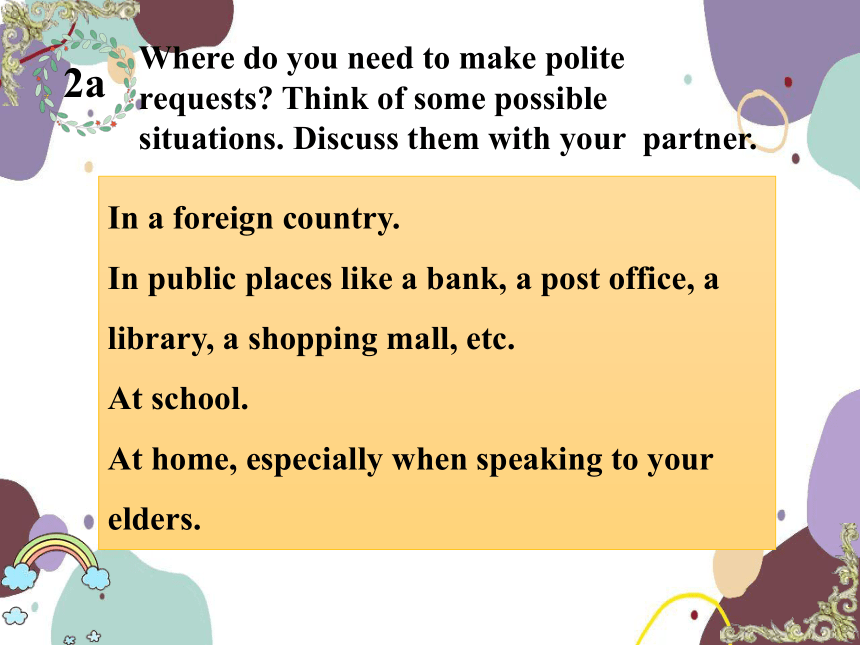
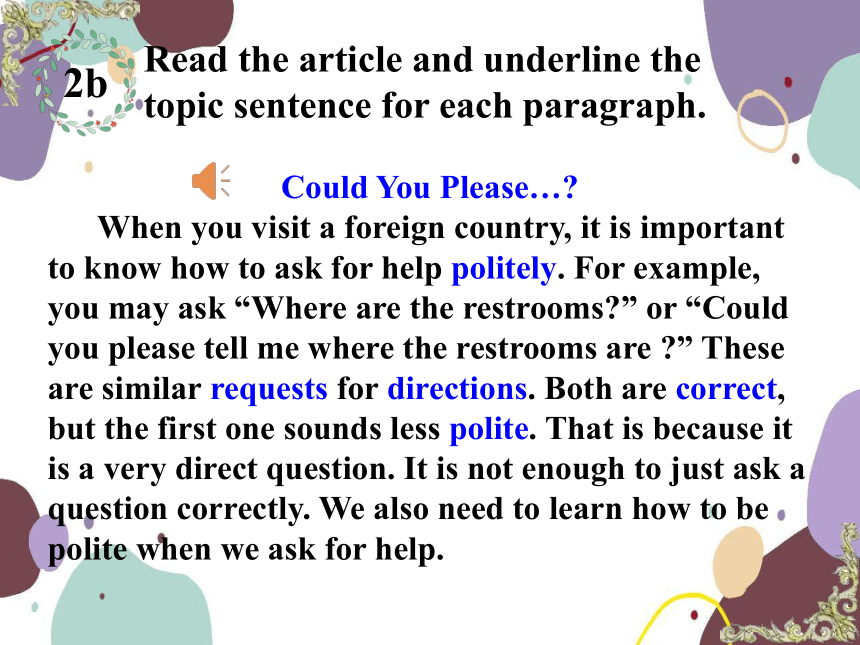
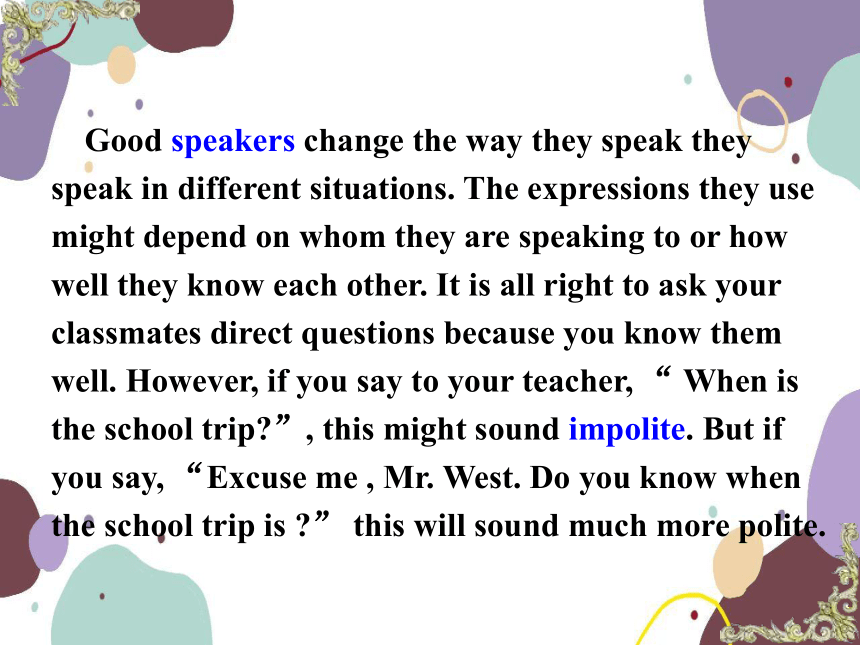
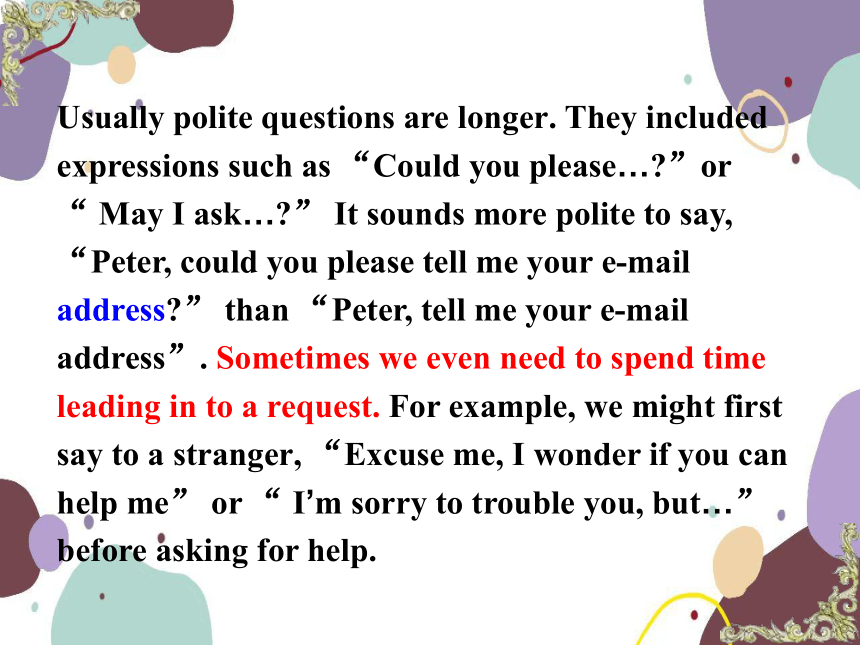
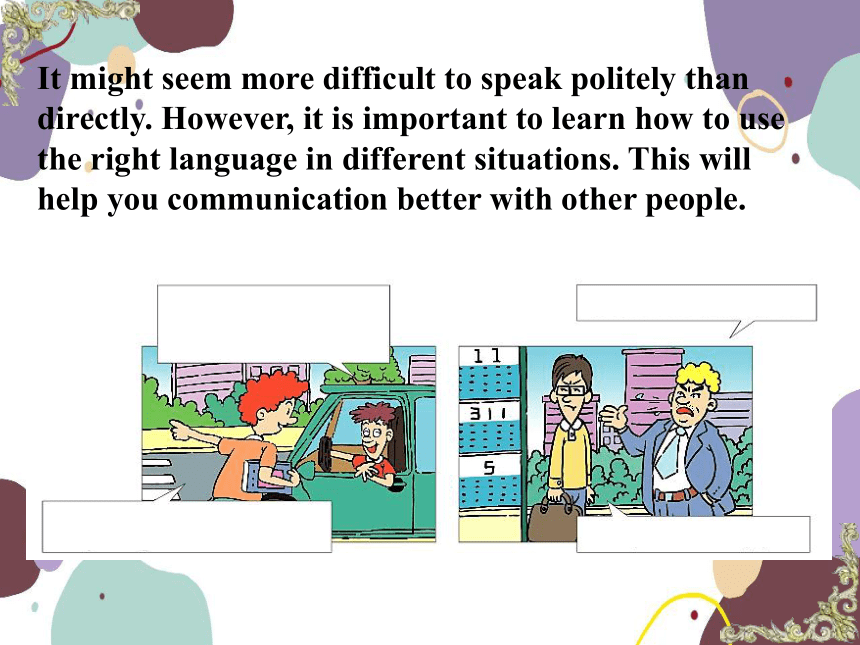
文档简介
(共32张PPT)
人教版九年级上册英语课件
Section B (2a-2d)
Unit 3
Could you please tell me where the restrooms are
Lead-in
Zhang Ming is traveling in the USA.
He wants to go to the East town but he doesn't know the way.
What should he do
Hi! Where is the East Town
Sorry. I can’t help you.
rude
impolite
less impolite
Lead-in
Excuse me. Could you please tell me where the East Town is
Sure. Take No. 23 Bus and you will get there.
Polite
Usually polite questions are longer. They include expressions such as “Could you please….. ”or “May I ask….. ” “I’m sorry to trouble you but…”“Excuse me, I wonder if you can help me….”.
It is not enough to just ask a question correctly. We also need to learn how to be polite when we ask for help.
Lead-in
New Words
Ⅰ. 单词拼写
1. request(n. & v. ) ______________
2. direction(n. ) ______________
3. whom(pron. ) ______________
4. 正确的; 恰当的(adj. ) ______________
5. 地址; 通讯处(n. ) ______________
要求; 请求
方向; 方位
谁; 什么人
correct
address
New Words
6. polite(adj.) →________ (adv. )礼貌地; 客气地
→________ (adj. )不礼貌的; 粗鲁的
7. direct(adj. ) →________ (adj. )间接的
8. speak(v. ) →________ (n. )讲(某种语言)的人; 发言者
politely
impolite
indirect
speaker
Ⅱ. 短语匹配
1. ask for A. 取决于; 依靠; 依赖
2. depend on B. 比如; 例如
3. each other C. 请求; 要求; 询问
4. such as D. 停车场; 停车区
5. parking lot E. 彼此, 互相
New Words
2a
Where do you need to make polite requests Think of some possible situations. Discuss them with your partner.
In a foreign country.
In public places like a bank, a post office, a library, a shopping mall, etc.
At school.
At home, especially when speaking to your elders.
2b
Read the article and underline the topic sentence for each paragraph.
Could You Please…
When you visit a foreign country, it is important to know how to ask for help politely. For example, you may ask “Where are the restrooms ” or “Could you please tell me where the restrooms are ” These are similar requests for directions. Both are correct, but the first one sounds less polite. That is because it is a very direct question. It is not enough to just ask a question correctly. We also need to learn how to be polite when we ask for help.
Good speakers change the way they speak they speak in different situations. The expressions they use might depend on whom they are speaking to or how well they know each other. It is all right to ask your classmates direct questions because you know them well. However, if you say to your teacher, “ When is the school trip ”, this might sound impolite. But if you say, “Excuse me , Mr. West. Do you know when the school trip is ” this will sound much more polite.
Usually polite questions are longer. They included expressions such as “Could you please… ”or “ May I ask… ” It sounds more polite to say, “Peter, could you please tell me your e-mail address ” than “Peter, tell me your e-mail address”. Sometimes we even need to spend time leading in to a request. For example, we might first say to a stranger, “Excuse me, I wonder if you can help me” or “ I’m sorry to trouble you, but…” before asking for help.
It might seem more difficult to speak politely than directly. However, it is important to learn how to use the right language in different situations. This will help you communication better with other people.
What do you think the two questions in paragraph 1
2. Why is using correct language not enough
Both are correct English, but the first one
sounds rude.
Because we need to learn how to be polite
when we make requests.
Paragraph 1
For example, you may ask “Where are the restrooms ” or “Could you please tell me where the restrooms are ”
3. What should we do when we are talking with different people
4. What might the expressions you use depend on
We should change the way (that / in which)
we speak.
They might depend on whom you are speaking
to or how well you know them.
Paragraph 2
5. If you are looking for your book, if you ask your teacher about it, you should say_____; if you ask someone (who / whom) you know well about it, you should say “_____”.
Where is my book
B. Excuse me, Mr. …
Do you know where my book is
A
B
默读第三段,判断正误
( )Usually polite questions are longer than impolite questions.
( )“Peter ,please tell me your e-mail address.” is a polite request.
( ) Before asking for help, you should say “Sorry, I wonder if you
can help me.”
( ) We don’t need time to lead in to a request sometimes.
T
F
F
F
Why is it important to use the right language in different situations
Because this will help you communicate better with other people.
Paragraph 4
1. …are similar requests for directions to a place.
(1)request可数名词,其后常跟for,意为“要求/请求…”
request可用作及物动词,其用法有:
①request sth.(from sb.)向某人请求…
②request sb. to do sth.请求某人做某事。
③request+that从句(从句用虚拟语气)
Grammar
(2)direction n. 方向;方位
Which direction does your room face
你的房间面向哪个方向
ask for directions 问路;请教, 请求指导
follow sb's directions 听从某人的指教(指示,指挥)
keep sb's directions in mind 记住某人的指示(指导)
give directions 发出指示 in all directions 四面八方
in every direction 四面八方 in the direction of 朝…方向
Grammar
(1)depend on 取决于,依靠…
2.The expressions they use might depend on whom they are speaking to or how well they know each other.
①depend on + 名词
Living things depend on sunlight .
②depend on + V-ing
We can depend on his coming on time .
③depend on + 从句
That depends on how you do it .
Grammar
(2)whom宾格人称代词, 意为“谁; 什么人”, 在句中作及物动词或介词的宾语。
①在口语和非正式用法中, whom放在句首时, 常常被who所代替。例如: Who/Whom is he talking to 他在和谁谈话
②若whom紧跟在介词之后, 则不可被who所代替。例如: He is a man from whom we should all learn.
他是我们大家都应该学习的人。
Grammar
3. Sometimes we even need to spend time leading in to a request.
有时我们甚至需要花一些时间来导入一个请求。
spend表示“花费”的两种常见结构
(1)spend+时间/金钱+(in)doing sth.
(2)spend+时间/金钱+on sth.
spend. . . doing sth. 花费……做某事
Grammar
如何表达“花费”
(1) + spend+ / +on sth. /(in)doing sth.
(2) +pay+ +for sth.
(3)sth. +cost+ +
(4)It takes+ / +to do sth.
Grammar
Find all the direct questions and polite requests from the passage.
Where are the restrooms
When is the school trip
Where’s the post office
Could you please tell me where the restrooms are
Excuse me , Mr West , do you know when the school trip is
Pardon me , could you please tell me where to park my car
2c
Read the requests below. In the second column, write A if you would say it to someone you know and B if you would say it to a stranger. In the last column, write where you think these people are.
2d
Ⅰ. 单项选择
1. The language you use depends ____ the relationship
and situation.
A. in B. on C. at D. for
2. It’s important to know ____ along well with others.
A. how get B. how get to
C. how to get D. to get how
3. I wonder ____ you can come to my party next Sunday.
A. if B. why C. that D. where
Exercise
4. —Can you tell me ______ you bought the gift for
—Sure. It’s for my best friend, Lucy.
A. where B. when C. how D. whom
5. It sounds more ______ to say, “Could you please tell me
how to get to the station ”
A. direct B. polite C. politely D. impolite
Exercise
Ⅱ. 完成句子
1. 学会如何礼貌地请求帮助是很重要的。
It’s important_____ _____ how to______ ______ help
politely.
2. 打扰一下, 你知道我在哪里能买到一些杂志吗
Excuse me, do you know_______ ______ _____ ______
some magazines
to learn
ask for
where I can buy
Exercise
3. 你能告诉我在哪里停车吗
Could you please tell me_______ ____ _______ my car
4. 这两种表达方式都对。
______ of the expressions______ correct.
5. 我们在不同的情境中和不同的人说话时应改变我们谈话的方式。
We should_______ ______ ______ we talk when we speak with different people in different situations.
where to park
Both
are
change the way
Exercise
书面作业 (Writing work)
(1)默写所学的新单词
(2) 完成学生用书的相关作业
Homework
谢谢观看
人教版九年级上册英语课件
Section B (2a-2d)
Unit 3
Could you please tell me where the restrooms are
Lead-in
Zhang Ming is traveling in the USA.
He wants to go to the East town but he doesn't know the way.
What should he do
Hi! Where is the East Town
Sorry. I can’t help you.
rude
impolite
less impolite
Lead-in
Excuse me. Could you please tell me where the East Town is
Sure. Take No. 23 Bus and you will get there.
Polite
Usually polite questions are longer. They include expressions such as “Could you please….. ”or “May I ask….. ” “I’m sorry to trouble you but…”“Excuse me, I wonder if you can help me….”.
It is not enough to just ask a question correctly. We also need to learn how to be polite when we ask for help.
Lead-in
New Words
Ⅰ. 单词拼写
1. request(n. & v. ) ______________
2. direction(n. ) ______________
3. whom(pron. ) ______________
4. 正确的; 恰当的(adj. ) ______________
5. 地址; 通讯处(n. ) ______________
要求; 请求
方向; 方位
谁; 什么人
correct
address
New Words
6. polite(adj.) →________ (adv. )礼貌地; 客气地
→________ (adj. )不礼貌的; 粗鲁的
7. direct(adj. ) →________ (adj. )间接的
8. speak(v. ) →________ (n. )讲(某种语言)的人; 发言者
politely
impolite
indirect
speaker
Ⅱ. 短语匹配
1. ask for A. 取决于; 依靠; 依赖
2. depend on B. 比如; 例如
3. each other C. 请求; 要求; 询问
4. such as D. 停车场; 停车区
5. parking lot E. 彼此, 互相
New Words
2a
Where do you need to make polite requests Think of some possible situations. Discuss them with your partner.
In a foreign country.
In public places like a bank, a post office, a library, a shopping mall, etc.
At school.
At home, especially when speaking to your elders.
2b
Read the article and underline the topic sentence for each paragraph.
Could You Please…
When you visit a foreign country, it is important to know how to ask for help politely. For example, you may ask “Where are the restrooms ” or “Could you please tell me where the restrooms are ” These are similar requests for directions. Both are correct, but the first one sounds less polite. That is because it is a very direct question. It is not enough to just ask a question correctly. We also need to learn how to be polite when we ask for help.
Good speakers change the way they speak they speak in different situations. The expressions they use might depend on whom they are speaking to or how well they know each other. It is all right to ask your classmates direct questions because you know them well. However, if you say to your teacher, “ When is the school trip ”, this might sound impolite. But if you say, “Excuse me , Mr. West. Do you know when the school trip is ” this will sound much more polite.
Usually polite questions are longer. They included expressions such as “Could you please… ”or “ May I ask… ” It sounds more polite to say, “Peter, could you please tell me your e-mail address ” than “Peter, tell me your e-mail address”. Sometimes we even need to spend time leading in to a request. For example, we might first say to a stranger, “Excuse me, I wonder if you can help me” or “ I’m sorry to trouble you, but…” before asking for help.
It might seem more difficult to speak politely than directly. However, it is important to learn how to use the right language in different situations. This will help you communication better with other people.
What do you think the two questions in paragraph 1
2. Why is using correct language not enough
Both are correct English, but the first one
sounds rude.
Because we need to learn how to be polite
when we make requests.
Paragraph 1
For example, you may ask “Where are the restrooms ” or “Could you please tell me where the restrooms are ”
3. What should we do when we are talking with different people
4. What might the expressions you use depend on
We should change the way (that / in which)
we speak.
They might depend on whom you are speaking
to or how well you know them.
Paragraph 2
5. If you are looking for your book, if you ask your teacher about it, you should say_____; if you ask someone (who / whom) you know well about it, you should say “_____”.
Where is my book
B. Excuse me, Mr. …
Do you know where my book is
A
B
默读第三段,判断正误
( )Usually polite questions are longer than impolite questions.
( )“Peter ,please tell me your e-mail address.” is a polite request.
( ) Before asking for help, you should say “Sorry, I wonder if you
can help me.”
( ) We don’t need time to lead in to a request sometimes.
T
F
F
F
Why is it important to use the right language in different situations
Because this will help you communicate better with other people.
Paragraph 4
1. …are similar requests for directions to a place.
(1)request可数名词,其后常跟for,意为“要求/请求…”
request可用作及物动词,其用法有:
①request sth.(from sb.)向某人请求…
②request sb. to do sth.请求某人做某事。
③request+that从句(从句用虚拟语气)
Grammar
(2)direction n. 方向;方位
Which direction does your room face
你的房间面向哪个方向
ask for directions 问路;请教, 请求指导
follow sb's directions 听从某人的指教(指示,指挥)
keep sb's directions in mind 记住某人的指示(指导)
give directions 发出指示 in all directions 四面八方
in every direction 四面八方 in the direction of 朝…方向
Grammar
(1)depend on 取决于,依靠…
2.The expressions they use might depend on whom they are speaking to or how well they know each other.
①depend on + 名词
Living things depend on sunlight .
②depend on + V-ing
We can depend on his coming on time .
③depend on + 从句
That depends on how you do it .
Grammar
(2)whom宾格人称代词, 意为“谁; 什么人”, 在句中作及物动词或介词的宾语。
①在口语和非正式用法中, whom放在句首时, 常常被who所代替。例如: Who/Whom is he talking to 他在和谁谈话
②若whom紧跟在介词之后, 则不可被who所代替。例如: He is a man from whom we should all learn.
他是我们大家都应该学习的人。
Grammar
3. Sometimes we even need to spend time leading in to a request.
有时我们甚至需要花一些时间来导入一个请求。
spend表示“花费”的两种常见结构
(1)spend+时间/金钱+(in)doing sth.
(2)spend+时间/金钱+on sth.
spend. . . doing sth. 花费……做某事
Grammar
如何表达“花费”
(1) + spend+ / +on sth. /(in)doing sth.
(2) +pay+ +for sth.
(3)sth. +cost+ +
(4)It takes+ / +to do sth.
Grammar
Find all the direct questions and polite requests from the passage.
Where are the restrooms
When is the school trip
Where’s the post office
Could you please tell me where the restrooms are
Excuse me , Mr West , do you know when the school trip is
Pardon me , could you please tell me where to park my car
2c
Read the requests below. In the second column, write A if you would say it to someone you know and B if you would say it to a stranger. In the last column, write where you think these people are.
2d
Ⅰ. 单项选择
1. The language you use depends ____ the relationship
and situation.
A. in B. on C. at D. for
2. It’s important to know ____ along well with others.
A. how get B. how get to
C. how to get D. to get how
3. I wonder ____ you can come to my party next Sunday.
A. if B. why C. that D. where
Exercise
4. —Can you tell me ______ you bought the gift for
—Sure. It’s for my best friend, Lucy.
A. where B. when C. how D. whom
5. It sounds more ______ to say, “Could you please tell me
how to get to the station ”
A. direct B. polite C. politely D. impolite
Exercise
Ⅱ. 完成句子
1. 学会如何礼貌地请求帮助是很重要的。
It’s important_____ _____ how to______ ______ help
politely.
2. 打扰一下, 你知道我在哪里能买到一些杂志吗
Excuse me, do you know_______ ______ _____ ______
some magazines
to learn
ask for
where I can buy
Exercise
3. 你能告诉我在哪里停车吗
Could you please tell me_______ ____ _______ my car
4. 这两种表达方式都对。
______ of the expressions______ correct.
5. 我们在不同的情境中和不同的人说话时应改变我们谈话的方式。
We should_______ ______ ______ we talk when we speak with different people in different situations.
where to park
Both
are
change the way
Exercise
书面作业 (Writing work)
(1)默写所学的新单词
(2) 完成学生用书的相关作业
Homework
谢谢观看
同课章节目录
- Unit 1 How can we become good learners.
- Section A
- Section B
- Unit 2 I think that mooncakes are delicious!
- Section A
- Section B
- Unit 3 Could you please tell me where the restroom
- Section A
- Section B
- Unit 4 I used to be afraid of the dark.
- Section A
- Section B
- Unit 5 What are the shirts made of?
- Section A
- Section B
- Review of Units 1-5
- Unit 6 When was it invented?
- Section A
- Section B
- Unit 7 Teenagers should be allowed to choose their
- Section A
- Section B
- Unit 8 It must belong to Carla.
- Section A
- Section B
- Unit 9 I like music that I can dance to.
- Section A
- Section B
- Unit 10 You're supposed to shake hands.
- Section A
- Section B
- Review of Units 6-10
- Unit 11 Sad movies make me cry.
- Section A
- Section B
- Unit 12 Life is full of the unexpected
- Section A
- Section B
- Unit 13 We're trying to save the earth!
- Section A
- Section B
- Unit 14 I remember meeting all of you in Grade 7.
- Section A
- Section B
- Review of Units 11-14
